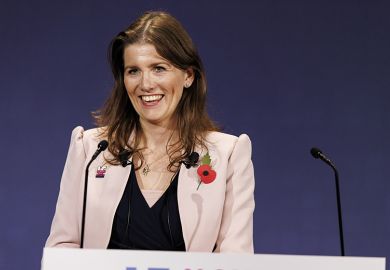The UK’s first department for science could face an uncertain future under a Labour government whose green investment plans will require closer ties between civil servants responsible for research and economic growth, sector experts have predicted.
The Department for Science, Innovation and Technology (DSIT) was established in February 2023 when staff from the former Department for Business, Energy and Industrial Strategy combined with colleagues from the former Department of Digital, Culture, Media and Sport, under the leadership of former universities minister Michelle Donelan.
Her Cabinet-level position raised hopes that science would have a stronger voice in 10 Downing Street, but some researchers have complained privately that ministerial attentions have been largely concentrated on regulation of emerging technologies, including the passing of the Online Safety Bill, as well as preparation for the world’s first AI Safety Summit at Bletchley Park.
Asked in November about the department’s first year, the UK’s chief scientific adviser Dame Angela McLean said that it “has been very focused” on artificial intelligence and agreed its attention “needs to broaden out on all kinds of science and technology”.
With Labour tipped to win a general election likely to be held in the second half of 2024, doubts have also been raised over DSIT’s long-term future, with some suggesting its workforce could return to the business department.
Andy Westwood, professor of government practice at the University of Manchester, said Sir Keir Starmer’s industrial strategy plans – including investing £28 billion a year in green projects – would be harder to achieve with a stand-alone science department.
“For Labour, I think it’s quite hard to have all these functions and budgets separated off from other departments and activities. That’s because their agenda is based on growth through an industrial strategy and green investment – both of which require all the activities, agencies and responsibilities in DSIT to be much more applied and wired into the demand side of the economy,” he said.
With former top mandarin Sue Gray examining Whitehall’s working arrangements for Labour, that change could be already under consideration, continued Professor Westwood.
“Getting this right appears to be in Sue Gray’s remit – that will also be about delivering the missions first and departmental structures are likely to be dictated by how they are organised. That does leave DSIT with some uncertainty hanging over it, as it’s not fully configured for an active industrial strategy role,” he said.
Returning science to the business department could also provide greater protection from funding cuts expected in a post-election spending review, added Diana Beech, chief executive of London Higher.
“As the public purse tightens and the government is forced to make tough decisions about investment, UK science may well find itself shouting into the void without the protection of a larger department and a big-hitting secretary of state with the ability to clock interdependencies across a wider portfolio and the clout to pull levers across Cabinet,” said Dr Beech.
“While I can see the appeal of having a dedicated Department for Science, Innovation and Technology for a government committed to showing it takes science seriously, siphoning our scientific endeavours off from both the universities and the businesses that are essential to their success risks undermining our research ecosystem, rather than strengthening it.
“The current Whitehall arrangement…not only risks disjointed policymaking, but leaves university-led research without a clear advocate in Cabinet committed to securing a comprehensive funding arrangement.”
Policies must “take account of essential cross-subsidies between teaching and research, including international education exports, as well as increased private and foreign and direct investment”, Dr Beech said.
Register to continue
Why register?
- Registration is free and only takes a moment
- Once registered, you can read 3 articles a month
- Sign up for our newsletter
Subscribe
Or subscribe for unlimited access to:
- Unlimited access to news, views, insights & reviews
- Digital editions
- Digital access to THE’s university and college rankings analysis
Already registered or a current subscriber?








